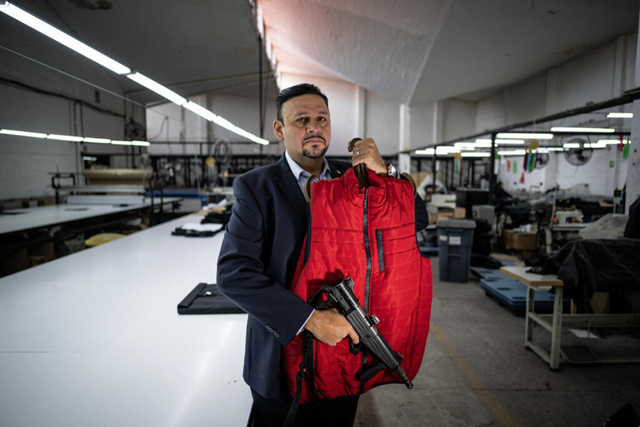News Flash
News Flash

MEXICO CITY, Oct 17, 2025 (BSS/AFP) - Gunshots rang out in a Mexico City warehouse as Leopoldo Cerdeira emptied a cartridge into a car door propped up on a stand.
The reason for the smoky handgun and scattering of bullet casings littered over the floor was that Cerdeira wanted to demonstrate the quality of his vehicles' armour plating in order to rent them out to wealthy foreign visitors coming to Mexico for the 2026 World Cup.
The head of security firm Ruhe proudly displayed how the bullets had been blocked by the solid synthetic layer that coats the entirety of his fleet of 70 vehicles.
This Mexican entrepreneur is ready for the World Cup, which his nation will co-host with the United States and Canada from June 11 to July 19 next year.
"Our bookings are for tourists, people who have money, who come to see the matches but are afraid because they have heard bad things about Mexico," said Cerdeira at his company's headquarters.
Cerdeira's luxury cars recently transported a FIFA delegation visiting Mexico, and the fleet, reserved for the Mexican Formula 1 Grand Prix at the end of the month, will increase to 80 vehicles for the global footballing showpiece.
But there is far more to the Mexican security industry than what are essentially personal, luxury armoured vehicles.
Drivers, armed escorts, bomb protection, bulletproof vests and armoured briefcases are just some of the other products offered by a sector that profits from the criminal violence that plagues Mexico -- a country with some 30,000 murders per year.
Much of this bloodshed is linked to Mexico's infamous drug cartels.
"The country's insecurity has led to the growth of our industry," said Gabriel Hernandez, head of Armoring Group, which sells bulletproof cars and clothing for civilians and military personnel in Mexico, Spain and the United States.
Next year's World Cup will see three Mexican cities host matches, with millions expected to flock to Mexico City, northern industrial city Monterrey and the booming home of tequila and Mariachi music, Guadalajara.
The opening match will be held in Mexico City, where 40,000 additional CCTV cameras have been installed, and the use of drones will be restricted in the three cities.
Local authorities say they are doing their utmost to ensure security for the World Cup, and while the capital -- the site of Pele's Brazil lifting their third world title in 1970 and Diego Maradona's Argentina their second in 1986 -- is usually spared from attacks by drug traffickers, the same cannot be said of the other host cities.
- 'World Cup truce' -
Guadalajara is the centre of operations for the Jalisco Nueva Generacion Cartel (CJNG), a group designated as terrorists by the United States, which has promised a reward of $12 million for the arrest of its leader, Nemesio Oseguera, known as 'El Mencho'.
To reassure clients beyond armour plating, there are car handles that can deliver electric shocks, wheels that can release a dose of pepper spray and tyres that can last for 80 kilometres (50 miles) after being punctured.
The daily price to hire one of Cerdeira's cars ranges from $800 to $1,100, plus an additional $500 for a driver and escort. For $1,500, customers can also purchase a discreet bulletproof vest.
However, such companies do not hold a monopoly on the Mexican private security industry.
The cartels have set up their own parallel sector, manufacturing 'monsters' -- huge vehicles with homemade armour plating.
Groups such as the CJNG have released videos showing their 'sicarios' (hitmen) parading around in these vehicles while armed to the teeth.
At the beginning of the year, authorities dismantled a clandestine armouring workshop in the state of Sinaloa, in the north-west of the country -- the stronghold of another of Mexico's major cartels.
The security industry has the additional concern of seeing its workforce fall into the hands of the cartels -- a challenge entrepreneurs claim to be tackling.
Eight years ago, two workers employed by Cerdeira were recruited by a criminal group.
According to the entrepreneur, these groups offer salaries three times higher, but the risk is enormous: his two former employees were found dead in the state of Sinaloa.
However, despite their dangerous nature, the cartels do not pose a direct threat to the World Cup, according to David Saucedo, a security consultant who works for embassies and local authorities.
"They themselves have a social base that will benefit from the matches," he explained.
Saucedo even refused to rule out a possible tacit agreement between the cartels and the authorities, who would commit to not conducting large-scale operations against the cartels in exchange for assurances that the latter will not carry out "bloody acts that would tarnish Mexico's image".
"It would be a kind of World Cup truce," added Saucedo.